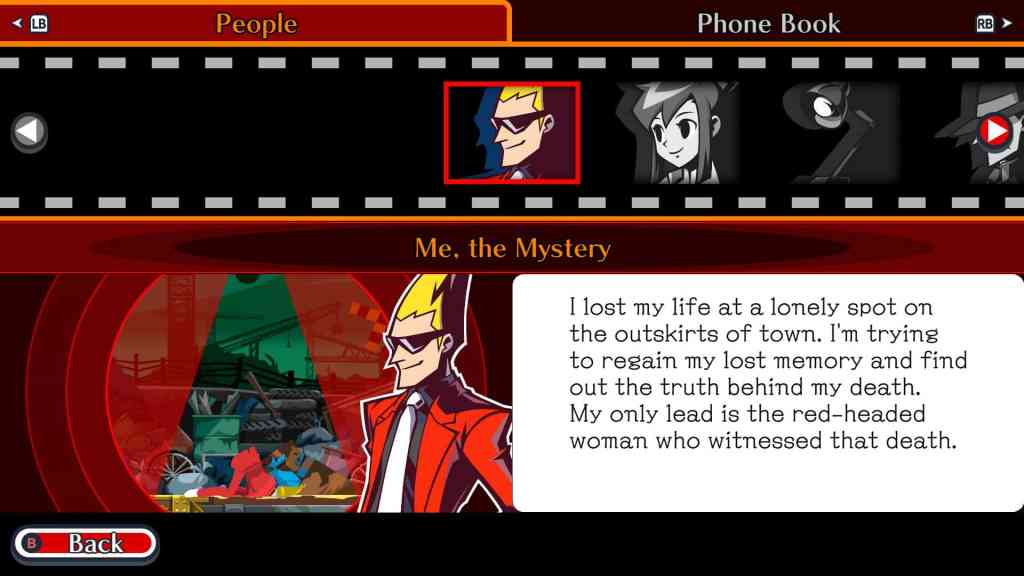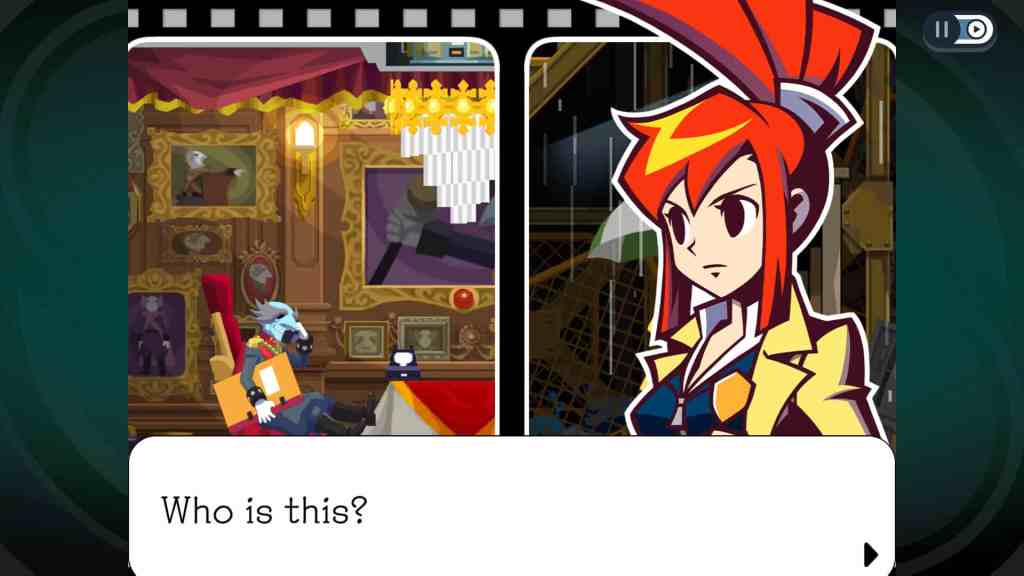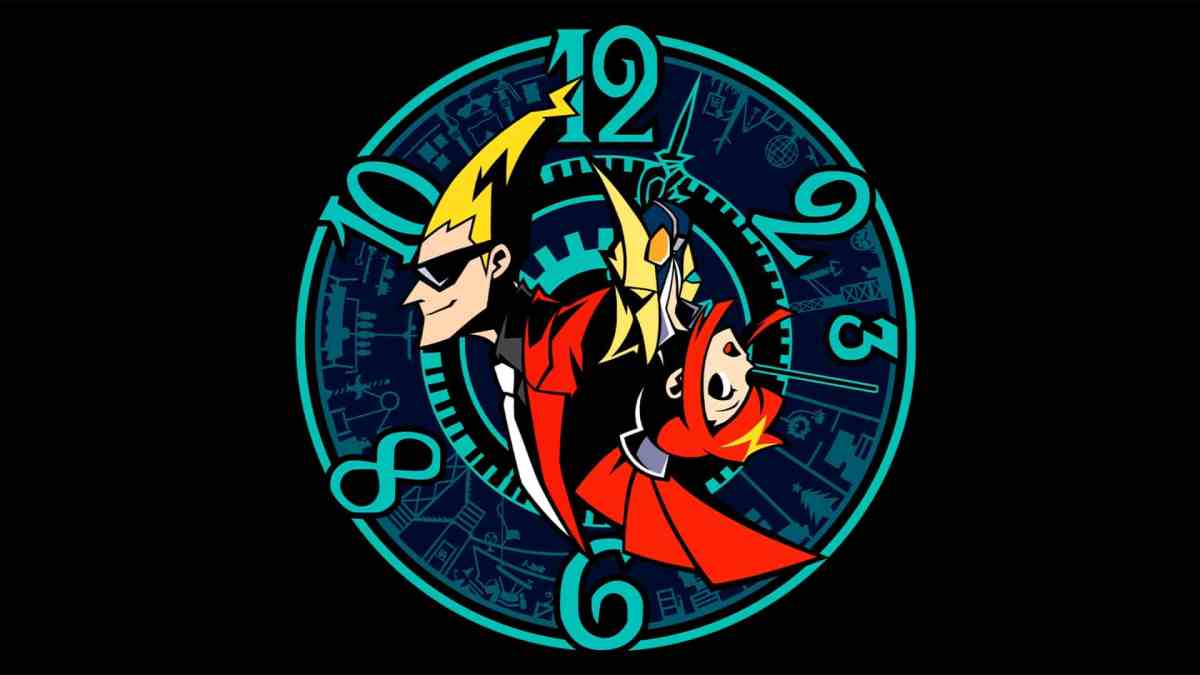In 2010, when Ghost Trick originally launched on the
In 2018, at the age of 11, the real Missile passed away. In a tweet, Takumi said that Missile had died suddenly soon after he returned from a business trip: ‘He must have been waiting for me to come back.’
Playing through Ghost Trick again in 2023, newly updated for modern systems, I found myself thinking about the real Missile a lot, and what it must mean for Takumi to see his beloved dog in this context once again. Ghost Trick is very much a game about the balance of life and death, and the power that we can possess beyond the end, both literally and figuratively.
Missile is part of a larger ensemble of lovable characters, all of which I greatly enjoyed revisiting again on the Switch. But Missile really is the star, and seeing him again, knowing that the real Missile is no longer with us, is a bittersweet experience. Missile is emblematic of the whole Ghost Trick experience – he’s funny, he’s heartwarming, he’s cute as a button, and he’s a deeper character than he first appears. Missile is an all-time great character in an all-time great game.
Ghost Trick has been resurrected in this new release, complete with HD graphics and a rearranged soundtrack by original composer Masakazu Sugimori (which can be subbed out for the original if you so desire, although they’re very similar). If you played the
The sharper art is gorgeous, all based on the original assets created for the DS release, but now much clearer – it’s one of those remasters that brings the game in line with how you remember it, rather than completely reinventing things; even the aspect ratio from the DS release is retained. If you missed Ghost Trick entirely the first time – which you likely did, considering the original game’s sales figures – this is now the definitive way to experience it.

Ghost Trick sets up a big central mystery up top. You play as Sissel, the amnesic spirit of a man who has recently been killed under mysterious circumstances, and who now stalks the afterlife with a newfound ability to jump between different objects and manipulate them – the titular ‘ghost trick’. Within moments of your death, you discover another, wilder ability: if you come across a corpse, you can rewind time to four minutes before their death and use your powers to save their life.
Through these powers, Sissel wants to figure out who he is and why he died – and naturally, solve the cascading series of additional mysteries that start to unveil themselves over the course of the single night the game is set across (at dawn, Sissel will cease to exist – a compelling hook).
Takumi is best known for the Ace Attorney series, and his recognisable fingerprints are all over this game’s twisty, elaborate plot and fun cast of characters, all brilliantly localised (bar a few typos that were present in the DS version and have, weirdly, not been fixed). If you’re a fan of the legal series, you’re bound to like this too. But Ghost Trick separates itself, as you might expect, through Sissel’s ghost powers.
Sissel can switch between the corporeal world and the ‘ghost’ world, leaping his spirit between ‘nodes’ that are tied to objects in each of the game’s environments. Through exploring these locations, which were glorious on the DS, and look even better on modern consoles, and listening in on conversations, Sissel is able to eventually unravel the game’s complicated plot.
The sequences where you undo deaths are the game’s standout puzzles. After witnessing a death, you can revisit the scene and try to influence things; shine a light on a would-be assassin before they fire the shot, draw a character’s attention by dropping an object to the ground, that sort of thing. Sissel’s powers aren’t hugely consistent, and there’s a trial-and-error element to these puzzles that can be frustrating. But when they click, they’re thrilling, asking you to find simple solutions to strange, abstract problems.
Again, Takumi’s influence is clear – they’re not unlike the courtroom sequences in Ace Attorney, even if the mechanics are very different. It’s all about examining the objects in front of you and determining which ones can present a pathway to salvation. There’s nothing too abstract or ridiculous, and the script during these sequences can, at times, be a little too hand-holdy and offer up solutions fast. But the life-and-death stakes of these puzzles are felt, and there’s real satisfaction in finding the right chain of events to reverse a character’s fate.
Ghost Trick was already an all-time favourite game of mine – at the end of 2011, I made an earnest attempt at having it named Hyper magazine’s Game of the Year (I was outvoted and Dark Souls won, which I suppose is fair). Playing it again now, quite a bit older and just a little wiser than I was back then, it hits even harder. I was delighted to realise that I remembered very few of the twists and turns (and had dramatically misremembered a few), and found them just as surprising as I did back then.

The story is enormously satisfying, paying off on every little thread and character beat. It’s outlandish and unpredictable, and by the end my brain felt like it was full of post-it notes and red threads connecting details. Ghost Trick strikes a difficult balance of measured absurdity – as silly as things can get, every turn is grounded in believable character motivation, every weird detail is explained well without being overexplained, everything makes total sense – a rare quality for a game this text-heavy.
I was also surprised at how much the Ghost Trick experience has deepened for me now that I’ve lived through 12 additional years of love and loss. As much as Ghost Trick dresses its themes up in comedy and excess, this is still, fundamentally, a game about undoing tragedies and resurrecting the dead. Like Ace Attorney, Ghost Trick asks you to fight hard for what’s right, to find justice in an unjust world, to cut through all the cynicism and the bullshit to find happiness and salvation. On this playthrough, I found Ghost Trick deeply touching. This is an earnest, uncynical game where you can make good things happen for people who deserve a win.
Which brings me back again to Missile. In real life, he was a beloved dog, loyal to the end. The character in Ghost Trick was designed with obvious love and reverence, and feels true to the relationship I like to imagine Takumi and Missile had. In another decade I can replay Ghost Trick again and Missile will still be there, and I can rediscover why I loved him in the first place. Some people feel that we live on through what they leave behind; coming back to Ghost Trick on Switch and seeing Missile again makes me feel like, at the very least, a temporary resurrection is possible if the thing we leave behind is special enough. Rest in peace, little buddy.
5 Stars: ★★★★★
Ghost Trick: Phantom Detective (Remastered)
Platforms: Nintendo Switch, PC, PlayStation 4, Xbox One, iOS, Nintendo DS
Developer: Capcom, Jupiter Corporation
Publisher: Capcom
Release Date: 30 June 2023 (Remastered), 19 June 2010 (Original)
The





